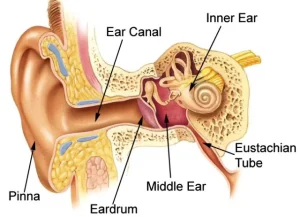Overview
Diagnosis of Airplane Ear
Diagnosis typically involves a review of symptoms and a physical examination of the ear.
-
Medical history: Your healthcare provider will ask about recent air travel, scuba diving, or pressure-related activities.
-
Ear examination: An ear exam is performed using an otoscope, a lighted instrument that allows the doctor to view the eardrum and detect fluid, swelling, or injury.
Treatment of Airplane Ear
For most people, airplane ear improves naturally over time. If symptoms persist, treatments can help equalize ear pressure and reduce discomfort.
Medicines
Certain medications can provide relief and help the ear heal more quickly.
-
Decongestant nasal sprays: Used before takeoff or landing to reduce nasal congestion and ease pressure changes.
-
Oral decongestants: Can help open the Eustachian tubes, making it easier to balance pressure.
-
Pain relievers: Nonsteroidal anti-inflammatory medicines (NSAIDs) such as ibuprofen (Advil, Motrin IB) or naproxen sodium (Aleve) can ease pain and inflammation. Acetaminophen (Tylenol) may also help relieve discomfort.
Self-Care Therapies
Home remedies and pressure-equalizing techniques are often effective in relieving mild symptoms of airplane ear.
-
Valsalva maneuver: Gently blow your nose while pinching the nostrils and keeping your mouth closed to open the Eustachian tubes.
-
Yawning, swallowing, or chewing gum: These simple actions can help equalize ear pressure during altitude changes.
-
Using filtered earplugs: Special earplugs can regulate air pressure during flights.
Surgery
Surgery is rarely needed to treat airplane ear. In most cases, even a burst eardrum or torn inner-ear membranes heal naturally.
However, in severe or persistent cases, your doctor may recommend a minor office procedure or surgery:
-
Myringotomy: A small cut is made in the eardrum to release pressure and drain any trapped fluid. This helps restore normal ear function and relieve pain.
Prevention Tips
-
Use decongestants before flying if you have a cold, sinus infection, or allergies.
-
Stay awake during takeoff and landing to actively swallow or yawn.
-
Avoid air travel when you’re congested, if possible, to reduce the risk of barotrauma.
Advertisement

